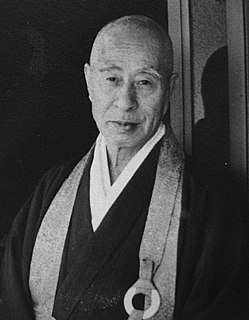A Quote by D.T. Suzuki
Zen abhors repetition or imitation of any kind, for it kills. For the same reason Zen never explains, but only affirms. Life is fact and no explanation is necessary or pertinent. To explain is to apologize, and why should we apologize for living? To live—is that not enough? Let us then live, let us affirm! Herein lies Zen in all its purity and in all its nudity as well.
Related Quotes
Zen purposes to discipline the mind itself, to make it its own master, through an insight into its proper nature. This getting into the real nature of one's own mind or soul is the fundamental object of Zen Buddhism. Zen, therefore, is more than meditation and Dhyana in its ordinary sense. The discipline of Zen consists in opening the mental eye in order to look into the very reason of existence.






















